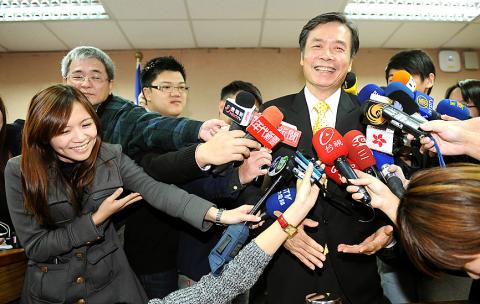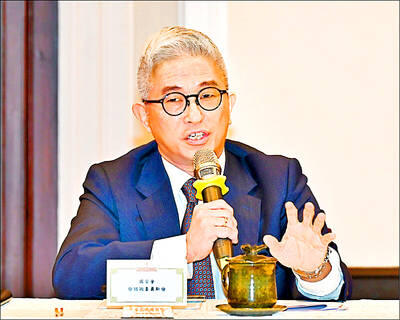Representative to the US King Pu-tsung (金溥聰) told lawmakers yesterday that he has never heard of the interpretation of the US’ “one China policy” that Washington does not recognize Taiwan as part of China.
At a meeting of the legislature’s Foreign Affairs and National Defense Committee, King was asked by Democratic Progressive Party Legislator Mark Chen (陳唐山) to explain the difference between Beijing’s “one China” policy and the US’ “one China” policy.
Whenever the US mentions its relations with China, it always emphasizes that the three communiques are essential elements it must abide by, aside from its “one China policy,” Chen said.

Photo: Liu Hsin-de, Taipei Times
Chen asked King how the “one China” policy the US has pursued since 1972, as reflected in the Shanghai Communique, the Joint Communique on the Establishment of Diplomatic Relations between the US and China and the 817 communique, differs from China’s “one China” policy.
King, who has been representative to the US since December 2012, appeared to struggle to answer the question.
“There is a difference in the choice of words between ‘recognize’ and ‘acknowledge’ in English. You know better than I do,” King said, referring to the US’ use of the term “acknowledge” rather than “recognize” in response to Beijing’s position that “there is but one China, and Taiwan is part of China.”
He added that Taiwan wished that the US would mention the “six assurances,” made by former US president Ronald Reagan in 1982, more often, because one of the “six assurances” is of great importance: that the US would not alter its position regarding sovereignty over Taiwan.
King then asked Chen to be more specific about his question.
Chen told King that his understanding of the difference is that “the US never recognizes Taiwan as part of China at all.”
Chen said the understanding is based on what he has learned from his “long-term communications with the US.”
In response, King said: “It’s the first time I have heard of this.”
Chen told King that he should gain a better understanding of the issue.
When contacted by the Taipei Times by telephone after the exchange, Chen said he took up the issue with King to “remind” him that as the nation’s representative to the US, “he should have known and understood the subtleties.”
Chen said that the US has always clarified China’s claim that the US recognized its contention that Taiwan is part of China, as public records have shown.
“If the US agreed to China’s ‘one China’ policy, it wouldn’t bother mentioning the three communiques,” Chen said.
The issue of what position the US has on Taiwan’s intent to join the nascent Trans-Pacific Partnership (TPP) was at center of discussion at the committee meeting yesterday.
King downplayed the concern raised by several lawmakers across party lines that the US seems to be less enthusiastic about supporting Taiwan’s membership in the TPP than toward Japan and South Korea.
“The responses we have received from the US’ public and private sectors have been positive,” he said. “We need to get ourselves ready for trade liberalization and get rid of protectionist measures and we will be able to join the TPP when the time is appropriate.”
Pressed to give a timetable, King said he would work hard to achieve the objective recently suggested by former premier Sean Chen (陳?), that Taiwan enter into TPP negotiations next year.
King declined to elaborate what trade irritants exist between Taiwan and the US that some lawmakers said have made the latter hesitant to support Taiwan’s inclusion in the TPP negotiations, citing confidentiality.
Asked to assess if China is an obstacle to Taiwan’s TPP bid, King said he was “not 100 percent sure,” but he has never heard from US officials that China is a factor in the decision.
Regarding arms sales, King said diesel-electric submarines “top the list of Taiwan’s most-wanted weapons from the US.”
Taiwan for years has requested eight diesel-electric submarines from the US to counter China’s increasingly advanced naval capabilities, but the US has not produced diesel-electric submarines domestically since the 1950s.
Asked whether there are talks on the possibility of the US transferring its production technologies to enable Taiwan to produce the submarines, King said he could not comment.
Another issue of concern to lawmakers was the quality of US weapons.
Six AH-64E Apache helicopters, recently delivered to Taiwan as a first batch, have been grounded for safety checks due to a malfunction in a helicopter of the same model used by the US Army.
Meanwhile, a malfunction was also found in the flight control system on board two of the 12 P-3C marine patrol aircraft.
DPP Legislator Chiu Yi-ying (邱議瑩) said she suspected the US was pressed by China to provide Taiwan with faulty weapons.
Records showed that Taiwan failed to get weapons as advanced weapons those obtained from the US by Japan, Australia, Japan, Indonesia and India at the same price, signaling that Taiwan’s strategic position was in decline, Chinese Nationalist Party (KMT) Legislator Chen Cheng-hsiang (陳鎮湘) said.
King promised to convey the concerns to the US.
With regard to the wish of President Ma Ying-jeou (馬英九) to meet with Chinese President Xi Jinping (習近平) at this year’s APEC summit in Beijing, King said he did not know what opinions the US has on the issue because it was never brought up.

A car bomb killed a senior Russian general in southern Moscow yesterday morning, the latest high-profile army figure to be blown up in a blast that came just hours after Russian and Ukrainian delegates held separate talks in Miami on a plan to end the war. Kyiv has not commented on the incident, but Russian investigators said they were probing whether the blast was “linked” to “Ukrainian special forces.” The attack was similar to other assassinations of generals and pro-war figures that have either been claimed, or are widely believed to have been orchestrated, by Ukraine. Russian Lieutenant General Fanil Sarvarov, 56, head

SAFETY FIRST: Double the number of police were deployed at the Taipei Marathon, while other cities released plans to bolster public event safety Authorities across Taiwan have stepped up security measures ahead of Christmas and New Year events, following a knife and smoke bomb attack in Taipei on Friday that left four people dead and 11 injured. In a bid to prevent potential copycat incidents, police deployments have been expanded for large gatherings, transport hubs, and other crowded public spaces, according to official statements from police and city authorities. Taipei Mayor Chiang Wan-an (蔣萬安) said the city has “comprehensively raised security readiness” in crowded areas, increased police deployments with armed officers, and intensified patrols during weekends and nighttime hours. For large-scale events, security checkpoints and explosives

‘POLITICAL GAME’: DPP lawmakers said the motion would not meet the legislative threshold needed, and accused the KMT and the TPP of trivializing the Constitution The Legislative Yuan yesterday approved a motion to initiate impeachment proceedings against President William Lai (賴清德), saying he had undermined Taiwan’s constitutional order and democracy. The motion was approved 61-50 by lawmakers from the main opposition Chinese Nationalist Party (KMT) and the smaller Taiwan People’s Party (TPP), who together hold a legislative majority. Under the motion, a roll call vote for impeachment would be held on May 19 next year, after various hearings are held and Lai is given the chance to defend himself. The move came after Lai on Monday last week did not promulgate an amendment passed by the legislature that

PENTAGON ASSESSMENT: A US report said that even as China and Russia deepen their partnership, cooperation is hindered by a ‘mutual distrust’ of each other The Chinese People’s Liberation Army (PLA) as of October had doubled the number of ships and airplanes deployed around Taiwan compared with the previous two years, Vice Minister of National Defense Hsu Szu-chien (徐斯儉) said yesterday, a day after the opposition-controlled legislature voted against reviewing the government’s general budget for next year, including a NT$1.25 trillion (US$39.71 billion) special defense spending bill. The legislature’s vote against the Ministry of National Defense’s spending plans was regrettable, as the budget was designed to respond to the developing Chinese military threat, Hsu said on the sidelines of a legislative meeting on the general budget. Defense